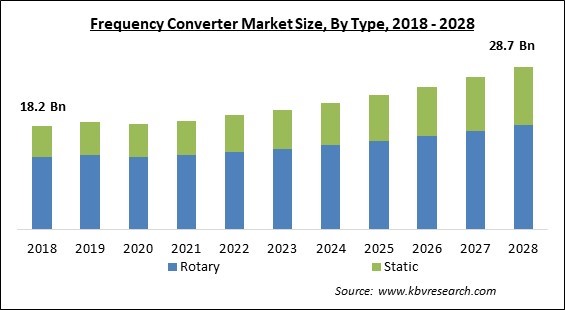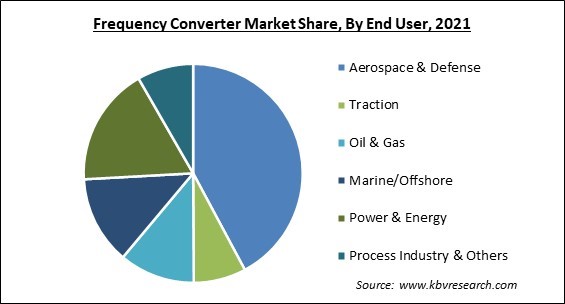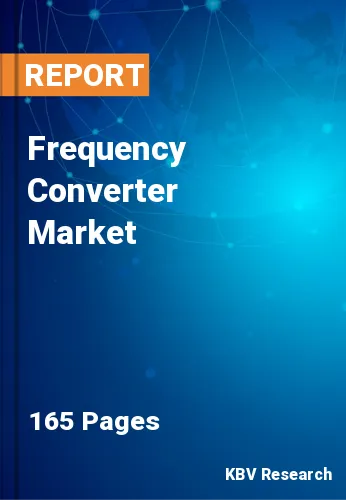The Global Frequency Converter Market size is expected to reach $28.7 billion by 2028, rising at a market growth of 6.1% CAGR during the forecast period.
A frequency converter is a mechanically controlled electromechanical device that changes the frequency of an alternating current. Apart from utility frequency, which varies by country and is either 50 Hz or 60 Hz, frequency converters allow the equipment and gadgets to work at their standard frequency. In many sectors, frequency converters are used to adjust the speed and torque of AC motors based on the demands of the load. Static and rotating frequency converters are the two types of frequency converters used in businesses for frequency conversion.

The growth of the frequency converter market is expected to be primarily driven by the development of high-speed rails, which need frequency converters to regulate the speed of engines and fans, as well as the widespread use of equipment in aerospace and defense sectors for monitoring axes. The modernization of electronic infrastructure serve as the main market drivers for frequency converters worldwide. High electrical efficiency is necessary right now, and using a frequency converter satisfies this need.
Along with that, the growing trend of offshore wind power generation is accelerating the overall demand for frequency converters. The industry's ongoing product advancements, such as the incorporation of sophisticated output filters that block common mode currents while also transforming phase-to-phase voltage into a sinusoidal signal, also boost the market's expansion.
Solid-state and rotational frequency converters are the two types of frequency converters. It is used by frequency converters to regulate the pump's speed. Both mechanical, as well as electrical loads, can be decreased with the use of frequency converters, which prolongs the life of motors, pumps, and other electrical and mechanical equipment. The input AC voltage is transformed into rotating mechanical force by the rotary frequency converter. The generator receives this rotational force via rotating mechanical strength. The generator transforms mechanical energy into AC electricity as an output.
The outbreak of the coronavirus has a significant influence on a variety of businesses and nations around the world. The growth rates of industries like construction and building, oil and gas, transportation, pharmaceuticals, energy, food processing, electronics, textiles, and others have decreased as a result of the economic shutdown. Furthermore, the COVID-19 impacted countries' decreased demand for power is predicted to hinder the expansion of the frequency converter market in 2020. Europe's major economies, including Germany, France, Spain, Italy, and others, are enforcing stringent regulations to stop the Coronavirus from spreading in their respective areas. As a result, there is a significant impact on the frequency converter supply chain and demand, which in turn restrained the market's growth until the start of production, and manufacturing worldwide.
The power distribution system connected to the motor is severely taxed when an AC motor is started across the line and required to supply 300–600% of its full load current. Depending on the size of the motor and the distribution system's capacity, when the supply voltage drops, it may cause connected sensitive equipment to trip offline because of the low voltage. Sensors, proximity switches, computers, proximity switches, and contactors are some examples of items that are voltage sensitive and may fail if a large AC motor line is started nearby. Since the motor is started at zero voltage and scaled up, variable frequency converters can help in removing this voltage sag.

Over the forecast period, it is anticipated that rising freshwater resource depletion coupled with accelerating urbanization and industrialization would drive increased demand for clean water. The need to adhere to severe regulatory laws pertaining to water & wastewater treatment worldwide, together with growing environmental concerns, is expected to support the market. Furthermore, it is projected that the investments in wastewater treatment facilities will gradually rise by the government authorities of different countries. In addition to this, technological development, and population growth have all led to an increase in the demand for fresh and treated water around the world.
Many customers experience "sticker shock" while trying to purchase a frequency converter. Whether the power frequency converter is an electronic (solid-state) unit or a rotary unit (motor-generator set) doesn't really matter. In addition, the cost disparity amongst vendors is actually fairly minimal. A frequency converter must entirely recreate the power in order to convert the frequency, in contrast to voltage conversion, which merely needs a relatively passive transformer. In a rotary converter, the drive motor transforms incoming electrical energy into mechanical power. The rotational energy is then fed into a generator, where it is transformed back into electrical output. Lots of gear, moving pieces, and costs.
Based on end-user, the frequency converter market is segmented into aerospace and defense; power and energy; oil and gas, traction, marine/offshore; process industry and others. The marine/offshore segment procured a significant revenue share in the frequency converter market in 2021. The marine industry, which consists of governmental organizations, shipping firms, cruise lines, auto ferry ports, naval dockyards, harbors, and marina operators, is actively looking for substitute methods of supplying shoreside power for the ships when they berth at the port.
On the basis of type, the frequency converter market is fragmented into static and rotary. In 2021, the rotary frequency converter segment held the largest revenue share in the frequency market. This is a result of rotary frequency converters being used more frequently in large applications with power ratings of at least 10 kVA. Rotary frequency converters are devices that change the frequency of power. This is accomplished by mechanically and electrically isolating a generator and attaching it to a motor. Direct coupling or coupling with belts and sheaves are both options.
| Report Attribute | Details |
|---|---|
| Market size value in 2021 | USD 19.2 Billion |
| Market size forecast in 2028 | USD 28.7 Billion |
| Base Year | 2021 |
| Historical Period | 2018 to 2020 |
| Forecast Period | 2022 to 2028 |
| Revenue Growth Rate | CAGR of 6.1% from 2022 to 2028 |
| Number of Pages | 165 |
| Number of Tables | 280 |
| Report coverage | Market Trends, Revenue Estimation and Forecast, Segmentation Analysis, Regional and Country Breakdown, Companies Strategic Developments, Company Profiling |
| Segments covered | Type, End User, Region |
| Country scope | US, Canada, Mexico, Germany, UK, France, Russia, Spain, Italy, China, Japan, India, South Korea, Singapore, Malaysia, Brazil, Argentina, UAE, Saudi Arabia, South Africa, Nigeria |
| Growth Drivers |
|
| Restraints |
|
Region wise, the frequency converter market is analyzed across North America, Europe, Asia Pacific and LAMEA. In 2021, Asia-Pacific led the frequency converters market with the highest revenue share. This is attributable to a rise in the requirement for a consistent and reliable power supply caused by population growth in Asia-Pacific, particularly in the nations like China, Japan, and India. Industries including oil and gas, power generation, food and beverage, and others are expanding quickly. The Asia-Pacific region's industrial and manufacturing sectors have seen an increase in automation, which has fueled the development of the frequency converter that is frequently used for timing and synchronization.
Free Valuable Insights: Global Frequency Converter Market size to reach USD 28.7 Billion by 2028
The market research report covers the analysis of key stake holders of the market. Key companies profiled in the report include Siemens AG, ABB Group, General Electric (GE) Co., The Danfoss Group, Aplab Limited, NR Electric Co., Ltd., Magnus Power Pvt. Ltd., KGS Electronics, Georator Corporation, and Advance Electronic Labs., Corp.
By Type
By End User
By Geography
The global Frequency Converter Market size is expected to reach $28.7 billion by 2028.
Reduce Disruptions To Power Lines are driving the market in coming years, however, Frequency Converter Are Usually Expensive restraints the growth of the market.
Siemens AG, ABB Group, General Electric (GE) Co., The Danfoss Group, Aplab Limited, NR Electric Co., Ltd., Magnus Power Pvt. Ltd., KGS Electronics, Georator Corporation, and Advance Electronic Labs., Corp.
The expected CAGR of the Frequency Converter Market is 6.1% from 2022 to 2028.
The Aerospace & Defense segment is leading the Global Frequency Converter Market by End User in 2021 thereby, achieving a market value of $11.2 billion by 2028.
The Asia Pacific market dominated the Global Frequency Converter Market by Region in 2021, and would continue to be a dominant market till 2028; thereby, achieving a market value of $10.7 billion by 2028.
Our team of dedicated experts can provide you with attractive expansion opportunities for your business.

